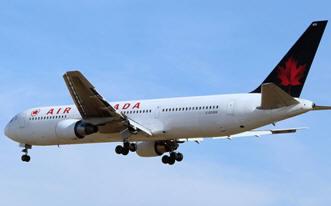|
|||||||||||||||||
|
|
|
|||
|
By Shane Nolan |
||||
 |
January 25, 2011- On
Thursday the International Air Transport Association (IATA)
called on the Canadian government to improve its global
competitiveness in air transport, travel and tourism by
working with industry to address issues of taxation and
regulation, security and the environment.
“Air
transport is key to |
|||
|
Bisignani noted that
“Aviation is the engine for tourism, which accounted for
650,000 Canadian jobs and $71 billion in spending in 2009.
But instead of having policies to welcome more
visitors,
Bisignani took aim at
He
also said that governments around the world are too involved
in the industry and are preventing airlines from operating
like other industries. “Airlines need the freedom to
consolidate wherever it makes business sense. Airlines that
facilitate globalization are stunted national businesses
because of government protection. The industry is
structurally sick and traditional leaders like
“Too
often governments try to live off past glory by protecting
the status quo and avoiding change. The challenge for |
||||
|
“
Bisignani also outlined a long-term vision using technology
to allow passengers to be screened without time wasted in
queues. “My vision is for hassle-free tunnels of technology.
Passengers would identify themselves with their fingerprint,
biometric passport and bar-coded boarding pass on a mobile
device. After a risk-level assessment, most passengers would
stroll through a tunnel of technology that checks for all
forms of terrorist elements without unpacking or undressing.
It’s in everybody’s interest to use the billions being spent
on security to make it more effective and more efficient,”
said Bisignani.
On
environment, “No industry has a future unless it is
environmentally sustainable.
Aviation is the most ambitious and united industry in
combating global climate change. Airlines, airports, air
navigation service providers and manufacturers are committed
to improving fuel efficiency by 1.5% annually to 2020;
capping net emissions with carbon-neutral growth from 2020
and cutting net emissions in half by 2050 compared to 2005.
The challenge is to keep governments focused on effective
measures to reduce emissions. For
On
profitability, Bisignani’s call for renewed competitiveness
came as the airline industry entered a second consecutive
year of profitability. Following a $15.1 billion profit in
2010, IATA is predicting that this will shrink to $9.1
billion in 2011. IATA contributed to these profits with cost
savings since 2004 that now exceed $55 billion. “For an
industry that generates nearly $600 billion in revenues the
margins are pathetic. The 2.7% margin that airlines earned
last year does not even cover the cost of capital which is
around 7-8%. And the margin will shrink to 1.5% this year,”
said Bisignani.
IATA
is using this window of profitability to host Vision 2050 in
“IATA
is proud to call |
|
|
| ©AvStop
Online Magazine
Contact
Us
Return To News
|
|

